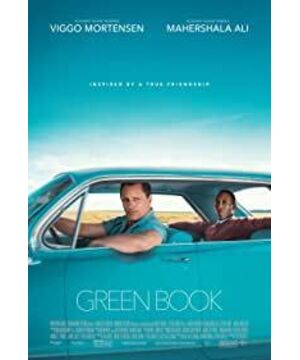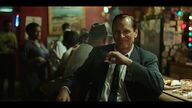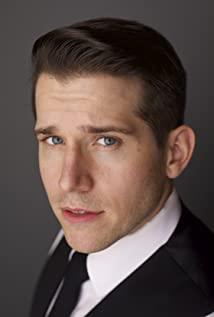The Green Book gave me a lot of inspiration. Most of this film review is my own subjective understanding, and I don't know whether it is right or wrong from other perspectives. If there are any deficiencies, please point out.
You'll never with violence. Tony, you only win when you maintain your dignity. Dignity always prevails.
Violence can never win, only maintain your dignity. Because self-respect will always get you in control.
Dan's "dignity" is the respect for the profession, the respect for etiquette, the courtesy to others, and the elegance that permeates the bones.
Dan could have performed in the North for three times the price of the South, but he insisted on going south just to gain "dignity" for the black race. Likewise, a "dignity" speaks to the hardships of black equality.
I watched the Oscars with curiosity.
After reading it, I really want to thank "Green Book", thank it for changing me from a person who didn't like watching movies very much, and likes to wander halfway through watching a movie, to a person who wants to find a movie every day when I have free time. A loyal audience who appreciates. When I watched "Green Book" for the first time, I didn't quite understand the content of the film. In this regard, I specifically went to search for relevant historical books, and after I learned about it, I read "Green Book" again. That's one of the reasons why I give Green Book a 5. I will find a relatively easy-to-understand article about this history, and cut a section as a background introduction to this movie.
After independence, the United States was originally divided into free states in the north and slave states in the south. The north mainly develops industry and advocates the abolition of slavery, while the south focuses on agricultural manor planting. Planting, especially cotton, requires a lot of labor. In order to make more money, the manor stubbornly insists on slavery and uses a large number of black slaves. Black slaves are black people who were trafficked from Africa to the North American continent by Western slave traders during the colonial period of North America.
...
The brutal and inhumane persecution of the black slaves by the estate owners in the southern states not only aroused the resistance of the black slaves, but also deeply dissatisfied the American masses, especially the white workers, farmers, intellectuals and citizens of the northern states. These white people with a sense of justice launched the abolition movement and advocated the liberation of black slaves.
...
The Emancipation Proclamation, officially implemented on January 1, 1863, declared that slaves in the southern states would be free from now on forever. (Excerpted from "The World's Five Thousand Years")
The content of the film took place in New York in 1962, nearly 100 years after the proclamation of the Emancipation Proclamation, when the white supremacy movement set off a small climax. Perhaps this background also makes the audience feel a little helpless in the original relaxed atmosphere.
After introducing the background, let's talk about my understanding of the film itself.
I think what makes this film superior to other films of its kind is the completeness of its characterization, the fullness of its details, and the way it handles conflict.
At the beginning of the film, the method of "earning the first mover" that is used in many film and television works is used. When the audience can hear the noise and whistling of the crowd when the screen is black, they will be curious about the scene at this moment. Sure enough, at the beginning of the film, by narrating what happened to the male protagonist Tony when he was working in a bar (Copa), it highlighted Tony's wisdom and wit in interpersonal communication, and the character characteristics that he was good at using violence to solve problems. As one of the male protagonists, Tony's character image has a general understanding.
Copa is closed for some reason. The movie here depicts in detail the liveliness of the family watching the football game in front of the TV after Tony returns home, rendering a warm family atmosphere, in order to divorce the other male protagonist of the movie, Donald Shirley and his wife loneliness in contrast. Contrast not only makes emotional expression stronger, but also makes contradictions more vivid. So although the theme of the film is racial equality, there are some contrasts and conflicts in the film that have nothing to do with skin color. For example, Dan's homosexuality, and Tony's character is more inclined to the black character in the traditional concept, and Dan's behavior is more like a white person with elegant manners in some people's hearts. I think these were not accepted by people at that time, but also to emphasize the closed and conservative thinking of most of the people in the society at that time, and to better understand the serious discrimination against people of color in the more southerly regions of the United States at that time. , so that the theme of the film is more vivid.
Tony had to find a new job in order to earn money to support his family. Became with the black Doc.Shirley. It is worth mentioning that in the above plot, Tony's wife put two glasses used by the workers in the sink after receiving black workers. Tony put them in the trash can with disgust after seeing them. When the wife found it, she picked it up and put it back in the sink. As well as the reluctance that his wife showed when they bid farewell to Tony, it created an image of a transparent, open-minded, virtuous and family-friendly wife, making it natural for the wife to agree to Tony's service to black people. The existence of his wife shows Tony's changes during the journey, which promotes the development of the plot. For example, the language of Tony's letter to his wife has changed. So the wife should be classified as one of the most important characters in the film.
It was arrogant for Tony not to help Dan with his luggage at the beginning of the trip, and he was slightly surprised and moved after hearing Dan's performance for the first time at the first stop of the trip, Pittsburgh Pennsylvania. It is very interesting that Dan told Tony for the first time on the way that he only played Steinway (Steinway, the top brand in the piano industry). Because Tony didn't know what brand it was, he casually wrote "Stain way" on the map, which was very meaningful, translated as "stained road", which can be said to hint at the clues of the whole film.
In Ohio, Tony wrote to his wife, "I think he gets sad and that's why he drinks too much," after seeing Dan drinking a bottle of Tailwind whiskey late at night, revealing that The only thing is the vague distress for Dan.
Later, Tony violently treated the administrator of the concert hall so that Dan could play Steinway (Steinway, the top brand in the piano world), and finally settled the dispute. Before you know it, two people who don't seem to have any connection, even the same personality, have an enviable friendship.
Continuing south, the discrimination against blacks becomes more obvious. Fortunately, the script uses an interesting, clever transition. It's no secret that it's discriminatory against black people to fry chicken in front of them. But because Tony didn't know this, he found Kentucky Fried Chicken in Kentucky (Kentucky), got out of the car to buy the fried chicken and invited Don to taste it. "Just relax and enjoy it." After accepting it embarrassingly, Don just gave a euphemistic evaluation "Just seems...so unsanitary", showing the usual gentleman's demeanor in his speech and demeanor.
The reason why this plot is so ingenious is because Don's next stop at Louisville Kentucky serves his host's big meal is home cooked fried chicken (home-style fried chicken), at this moment Don's polite and natural clapping when he applauds Part of the smile can't be attributed to Tony's "vaccination" ahead of time.
Discrimination against blacks was far worse in the South than in the North. When Don would rather go to a hotel to go to the toilet than violate the ridiculous rules, and would rather strike out for a meal than make compromises, and in order to maintain his dignity, after asking for a suit to be refused, tears filled his eyes, but he said "I see" and was bullied When he regarded it as a test instead of an insult, and when he received a favor and did not feel honored and regarded it as a shame, he just used calm to cover up his anger, but all these emotions had to explode when he played the piano music. So when I listen to his piano music, I hear more not skills, but emotions, helplessness, sadness, injustice, impassioned...
They just want to turn me into another black entertainer
He's the kind of person who talks about the piano with a cigarette in his mouth
A glass of whiskey on the piano
Also complained that no one respected him as much as Artus Rubinstein (Polish American Jew, famous pianist)
Artus Rubinstein wouldn't put whiskey on the piano.
(Wanted to turn me into just another “colored entertainer”
You know the guy who...
Smoking while he's playing, sets a glass of whiskey on his piano and then he complains because he's not respected like Arthur Rubinstein.
You don't see Arthur Rubinstein putting on a whiskey on his piano.)
In the last show in the film, Don's Rediscovering himself in the Black Community, Don has a detail before he plays, where he puts a glass of whiskey on the floor from the piano. This is his respect for who he is, his profession. Because he had said the above to Tony. He said it and did it.
They (Don's record label) firmly believe that listeners will never accept black pianists playing classical music.
(They insisted that autiences would never accept a negro pianist on the classical stage.)
Maybe Don has spent his entire life struggling with the various labels that the outside world has put on black people and fighting against it, but I think as viewers, our best understanding of this should be Tony's response to it.
...But your music, what you do, Only you can do that.
(Anyone can play Beethoven or that Bong
or someone else's music
but your music the music you make now
Only you can do it. )
Many people say that the title of "Green Book" has no direct connection with the plot, but I thought about it carefully and thought of some other film and television works that were criticized by some people for their bizarre titles and their plots were out of reality ("Green Book" is Inspired by a true story, but it was pointed out by Tony and Ton’s descendants that there are many discrepancies between the plot and reality), I have some doubts, is the title just summarizing the content and gist of the work? Why can't it show the clues of the work, why can't it imply the emotions of the characters? Film and television works have their artistic value, and they must be processed on the basis of real life to express the ideas they want to express. Better understand film and television works through reality, and better understand life through film and television works. So instead of entangled in whether the plot is real, it is better to think carefully about the philosophy it contains. I think the "Green Book" brought me not only a deep reflection on the issue of equal rights for blacks, but also a kind of discrimination in the society that we should think about in China in 2020.
Rather than saying that "Green Book" is a green passage for blacks (going south), it is better to say that it is a tragedy of black equality in history. The Green Book wouldn't exist if people didn't see skin color as a difference that needs to be treated differently.
Thinking from another angle, the "Green Book" really exists and has witnessed a great progress of human beings - at least in the current society, black people have dignity that they did not have before.
Discrimination really disappears when people don't take racism seriously. Just like black people now don't have to suffer such severe discrimination, they can even get government benefits. But ask yourself, is there really no discrimination in our lives? Are people really equal? Is all discrimination intractable through hard work? Discrimination in sports fields, discrimination in schools, discrimination between the so-called "rich" and "poor", some behaviors that do not violate morality but are discriminated against, some thoughts that are harmless in the world but are discriminated against... Such an obvious difference in skin color is used as a reason for discrimination. Why can't we be more tolerant and understanding of the "weak" groups who are discriminated against in our lives? No one should be discriminated against, even some self-deprecating people (black people) in the eyes of many people. Because everyone can get better.
"Green Book" told me to look at the world with a peaceful eye, try to empathize with things that I don't understand, and perceive things around me with empathy.
It's strange to say that "Green Book" reflects a political issue, but I thought about how to write a film review, and finally felt that it would be more appropriate to write some philosophies for us ordinary people. The reason why problems such as discrimination have to rise to the national level is that it cannot be solved well at the individual level, so it has become a national problem and a national problem.
In fact, discrimination is all kinds of advantages and disadvantages imagined by human beings, which can be solved through the progress of ideas from generation to generation. As a speck of dust on the earth, all I can do is to improve myself so that this "speck of dust" does not hinder the progress of the times. At the same time, it infects the "fine dust" around him. Only by being a little more careful can we make this world a warmer and more beautiful place and fundamentally solve the problem of discrimination.
View more about Green Book reviews











